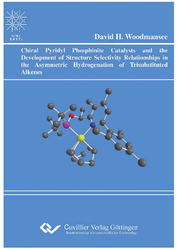| Departments | |
|---|---|
| Book Series (96) |
1381
|
| Nachhaltigkeit |
3
|
| Gesundheitswesen |
1
|
| Humanities |
2370
|
| Natural Sciences |
5408
|
| Mathematics | 229 |
| Informatics | 319 |
| Physics | 980 |
| Chemistry | 1364 |
| Geosciences | 131 |
| Human medicine | 243 |
| Stomatology | 10 |
| Veterinary medicine | 108 |
| Pharmacy | 147 |
| Biology | 835 |
| Biochemistry, molecular biology, gene technology | 121 |
| Biophysics | 25 |
| Domestic and nutritional science | 45 |
| Agricultural science | 1005 |
| Forest science | 201 |
| Horticultural science | 20 |
| Environmental research, ecology and landscape conservation | 148 |
| Engineering |
1795
|
| Common |
98
|
|
Leitlinien Unfallchirurgie
5. Auflage bestellen |
|
Advanced Search
Chiral Pyridyl Phosphinite Catalysts and the Development of Structure Selectivity Relationships in the Asymmetric Hydrogenation of Trisubstituted Alkenes (English shop)
David Harrison Woodmansee (Author)Preview
Table of Contents, Datei (82 KB)
Extract, Datei (150 KB)
The current trend in developing asymmetric catalysts is towards creating specialized molecules with tailored functions for increased selectivity in classes of substrates rather than general catalysts capable of broad application. In addition, the capacity to generate groups of catalysts with incremental changes to overall structure allows for a more detailed analysis of contributions to the structure selectivity relationships for a variety of substrates. This information can then be used to identify ideal catalysts or improve selectivity and activity of for a particular system.
Asymmetric hydrogenation of substituted alkenes with chiral iridium N,P complexes that were developed from the achiral Crabtree Complex have proven to be extraordinary selective and active catalysts. Screening a series of trisubstituted alkenes on 1st and 2nd generation catalysts indicated a strong enantioselectivity dependence on the phosphorus and pyridine substituents. In particular, the substituents in the ortho position of the pyridine ring were found to have significant control over the catalyst.
The synthesis of the 3rd generation of chiral pyridyl phosphinite catalysts takes advantage of a flexible late phase incorporation of the functional groups which govern the selectivity of the asymmetric hydrogenation to span a range of steric and electronic properties. The screening of these catalysts in the asymmetric hydrogenation of several classes of trisubstituted alkenes provided clear insight to the factors controlling enantioselectivity which were proven to vary greatly with the nature of the substrate and catalyst. Several catalysts with exceptional selectivity were identified for multiple examples of trisubstituted alkenes which had proven difficult with previous system.
| ISBN-13 (Printausgabe) | 3869554851 |
| ISBN-13 (Hard Copy) | 9783869554853 |
| ISBN-13 (eBook) | 9783736934856 |
| Final Book Format | A5 |
| Language | English |
| Page Number | 214 |
| Edition | 1 Aufl. |
| Volume | 0 |
| Publication Place | Göttingen |
| Place of Dissertation | Universität Basel |
| Publication Date | 2010-09-23 |
| General Categorization | Dissertation |
| Departments |
Chemistry
|
| Keywords | asymmetric hydrogenation, ligand design, iridium catalysis, asymmetric catalysis, modular synthesis |








